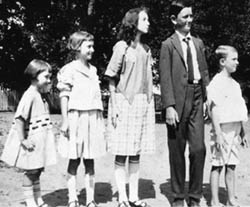Is it just me or does the world sometimes look better in shades of gray?
I'm speaking on literal and metaphorical levels here, because while I often crave bright, vibrant colors or stark black and white, often all I end up with is the 256 fountain steps of gray. From a purely illusory perspective, many people look WAY better in a grayscale (read: "black and white") picture as opposed to being exposed in the full color spectrum. For some reason the little flaws that we can see at 4.2 billion colors start to fade away, or become insignificant, at 256. The photographers will say that this so-called "black and white" image allows for sharper definitions of contrast and allows us to see things more clearly. I suppose, in some ways, I can by that, but completely? Back to this in a minute. In a world of politics and debate, with arguments thrown about like so many flailing matches from a pre-pubescent pyromaniac, games are often played with color, black and white, and shades of gray. Many is the time a politician will try to sell the black and white, while floundering around in the gray, with every consequence of every decision affecting the realities of those in full color. Politicians are afraid color - and I'm not talking ethnicity here, I'm simply talking reality - because their game-playing occurs on boards, on maps, on committees, and on public display, but little of it has to do with touching reality as a prime motivator. Politicians push money around for ideological purposes, claiming that the left is right or that the right has left the building, when really their 2D glasses only permit them to see the gray of the newspapers or pundit websites or the straining pixels of primetime news. If politicians were to look at the world in color, they would start to see the flaws, not just in the system - which is a statistic - but in faces of everyone who they claim to represent; each of which is a tragedy. It is far easier to look at reports on poverty from your home constituency than to walk the neighborhoods on a day when social assistance is still a week away and the cupboards are empty. It is far easier to look at low area test scores in schools and blame the curriculum, the textbooks or the teachers for mis-educating children who walk through embittered streets without breakfast every winter morning in worn out no-name running shoes. It is far easier to shut down public hospital emergency rooms in the name of efficiency than to face the one family who lost a father, mother, sister or brother because the reported distance "new" closest ER, which was spun in the newspapers as only six minutes further, didn't take into account rush hour traffic and construction. If politicians were to look at the world in color, they would, no doubt, be stunned into a silence at the ineffectiveness of their game, and proceed to hurl the box, dice, fake money, hotels, houses, race car, iron, boot, thimble, top hat and all into the nearest open flame. It's not that a politician, on average, can't see color; it's simply too painful to look. And so we defend our beliefs in black and white. We spout statistics and spin numbers and count and add and multiply and generate long, intricate reports with copious circling in red ink and meaningfully-highlighted grand totals. We take the black and white and, with all the best intentions, set out to resolve the issues. But the issues are not black and white anymore. The issues are grey and mottled. They are borne on the backs of centuries of value and belief systems. They are entrenched in histories of languages, totems, borders, rituals, and power struggles. All of the sudden, our black and white numbers and words don't seem so black and white anymore. All of the sudden our best intentions become lost in the give and take. All of the sudden the solution for 4.2 billion individuals has been reduced to two sides that, instead of being flexible enough to accommodate the most possible, has been pared down to accommodate 2: the remaining person at either side of the table. Though I have been hammering politicians as an optimal example, the simple truth is that politician in all of us, who concedes, consorts, collaborates, convinces, controls, and conquers, is just as guilty. Isn't it easier for us to avoid the real? As bright and vibrant as 4.2 billion shades are, and as beautiful, inspiring and rich as this diversity bestows, for most of us, the world sometimes looks better in shades of gray. Because while the clarity of color that sometimes pierces the veil can make life worth living, it can also make life worth questioning. And so I watch, without guilt or shame, because neither would prompt such change as is necessary to make me lift the blinders 24/7. And maybe that's the greatest flaw in all of us.









